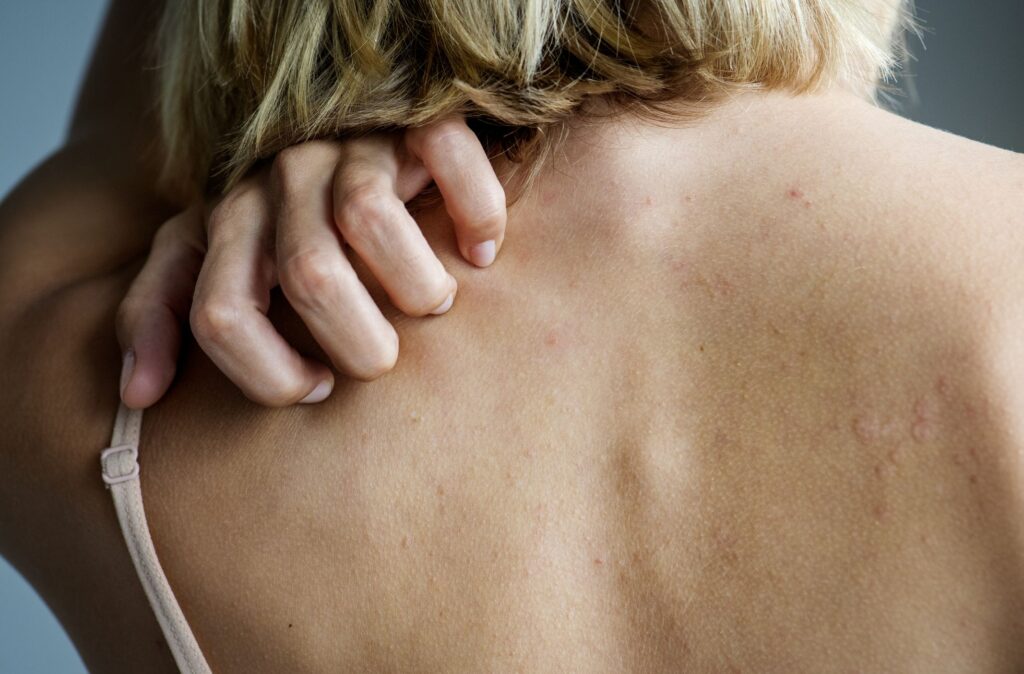You may have heard that bathing too often can be harmful to your skin. But if you take a shower or bath every day, it might be because of some other reasons.
Table of Contents
You may have heard that bathing too often can be harmful to your skin. But if you take a shower or bath every day, it might be because of some other reasons.
Skin rashes are one of the most common reasons behind itching after bathing. It is also possible that you get an allergic reaction when you use a new soap or shampoo.
In this article, we will discuss the causes of itching after a shower and what you can do to get rid of the irritation.
Why Does Skin Itch After A Bath?
The irritation on your skin after a shower may be caused by one or many of the reasons listed below.
1. Dryness Of Skin
The most common culprit behind itchiness post bath is excessively dry skin, a condition also known as xerosis cutis. If you already have dry skin, taking a bath further strips the natural oils on your skin. This makes your skin feel dehydrated and itchy after a bath. If the water is too hot or if you are taking prolonged showers or multiple showers a day, the condition may worsen. In extreme cases, your skin may break and cause mild bleeding.
Bathing in water that is too hot can also cause itchiness and redness in your body parts such as face, neck and shoulders due to irritation of nerve endings in these areas. This condition is called thermal burn or thermal dermatitis due to water hardness removal.
2. Sensitivity To Cleansers
If you are suffering from rashes after bathing, there could be several reasons for this. The most common cause is that you may be sensitive to the soap, body shampoo or other products that you are using in the shower. This can be responsible for the urge to scratch during or after you shower. If you are using a strong cleansing agent, it can rip off the skin’s protective barrier and natural oils, making it sensitive and itchy.
Also note that you may be allergic to certain ingredients in cleansers such as foaming agents, fragrances, alcohol or menthol. These may be the culprit behind your irritation post shower. If you are allergic to detergents, your fresh towel from the laundry can also cause you itchiness after you have used it in the shower.
3. Underlying Skin Conditions
– Aquagenic Pruritus
Rashes after bathing is a condition in which the patient develops intense itchiness as soon as their skin comes in contact with water. The itchiness develops mostly in the limbs and upper part of the body, but rarely on the head, face or neck. But there are no rashes or other visible changes on the skin. This condition affects both men and women equally.
– Eczema
The skin barrier function is weakened in people with eczema, which makes them more susceptible to sensitivity and irritation of the skin. This may lead to itchiness post shower in eczema patients. A good practice that they can get used to when showering or bathing, is to dilute the washing soap or looking for mild soaps that are free from fragrance, dyes and preservatives. Additionally, applying a moisturizer after drying off after bathing may also help treat eczema flare-ups.
How Can You Stop The Itching After A Bath?
There are a number of reasons why you may be experiencing itchy skin after showering.
Most people tend to experience irritation after a hot shower, but there are some who may also feel itchy when they use lukewarm water or even cold water. Irritation can also result from using harsh soaps or scrubbers on your skin.
Here are some tips on how to reduce the risk of itchiness after bathing:
1. Skin Care Routine
The first step to help prevent rashes after bathing is to maintain a healthy skin care routine. Maintain a healthy diet, avoid excessive sun exposure and keep your skin hydrated by drinking enough water every day. Also drink lots of water to keep your skin hydrated and prevent itchiness in the long run.
2. Switch Soaps
Avoid soaps and cleansers with harsh chemicals, fragrances or menthol. Opt for a milder soap designed for sensitive skin. You can also try bath salts, herbal soaps or natural cleaners such as fuller’s earth in place of your regular soap. It is important to choose hypoallergenic products that suit your unique skin type.
3. Towel It Right
Do not rub wet skin right after a shower. This can cause the protective layer of your skin to be ripped off, causing irritation. Pat your skin dry in a gentle manner, with a clean towel. Change the laundry detergent used to clean your towel, if you feel that you may be allergic to the detergent.





More Stories
What Makes an Artisan Gift Set So Special? Tips and Ideas for the Perfect Popcorn Gift Set
How to Navigate Heating Installation in Roseville, CA: Tips, Advice & What to Expect
Elevate Your Space with Hypebeast Wall Art: A Bold Statement in Luxury Décor